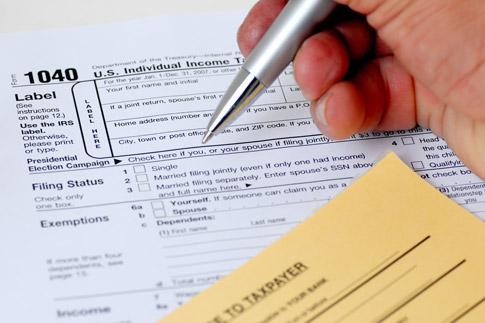Published
Writer
Andrew Zumwalt
 If you pay someone to do your taxes, be careful. Most tax return preparers are professional and honest, but some are not. Some preparers offer high-cost services or arrange refund anticipation loans that reduce refunds. Take the time to find a qualified tax professional. As a taxpayer, you are ultimately responsible for everything on your return no matter who prepared it. Consider using the tips below to choose a preparer who best meets your tax preparation needs.
If you pay someone to do your taxes, be careful. Most tax return preparers are professional and honest, but some are not. Some preparers offer high-cost services or arrange refund anticipation loans that reduce refunds. Take the time to find a qualified tax professional. As a taxpayer, you are ultimately responsible for everything on your return no matter who prepared it. Consider using the tips below to choose a preparer who best meets your tax preparation needs.
- Ask about service fees. Avoid preparers who claim they can get larger refunds than others, those who guarantee results, or those whose fees are based on a percentage of the refund.
- Choose a preparer you will be able to reach after the return is filed. Some preparers only operate during the tax season.
- Ask questions and get references from tax preparers’ former clients. Were they satisfied with the service? Did they pay reasonable fees?
- Beware of a preparer who guarantees results or who bases fees on a percentage of the amount of the refund. A practitioner may not charge a contingent fee (percentage of your refund) for preparing an original tax return.
- Understand that the most reputable preparers will request to see your receipts and will ask you multiple questions to determine your qualifications for expenses, deductions and other items. By doing so they have your best interest in mind and are trying to help you avoid penalties, interest or additional taxes that could result from an IRS examination.
- Choose a preparer you will be able to contact and one who will be responsive to your needs. Ask who will actually prepare the return before engaging services. Avoid firms where your work may be delegated down to an unknown worker or someone with less training. You should know exactly who works with your tax matters at all times and how to contact him or her; after all, you are paying for it. Determine if the preparer is exporting your return to a foreign country for preparation. Foreign countries do not have the same security and privacy laws as the United States nor is there any recourse should your information be compromised as a result of lax or nonexistent privacy procedures.
- Check with the Better Business Bureau to see if the preparer has a history of complaints. Contact the state’s board of accountancy for CPAs or the state’s bar association for attorneys. Find out if the preparer belongs to a professional organization that requires members to pursue continuing education and holds them accountable to a code of ethics.
- Check preparers’ credentials. Are they an enrolled agent, Certified Public Accountant or tax attorney? Only enrolled agents, CPAs and attorneys can represent taxpayers with the IRS in audits, collection actions and appeals. Other return preparers may represent taxpayers only in audits of a return they signed as a preparer.
- Do you qualify for free tax preparation services? Many communities have Volunteer Income Tax Assistance (VITA) or Tax Counseling for the Elderly (TCE) sites. Through these programs, volunteers provide assistance to low-income, disabled, homebound and English-as-a-second-language taxpayers. Visit "Free tax return preparation for qualifying taxpayers" for more information on the VITA and TCE programs and how to locate sites in your area.
Taking time to do your homework can pay off by saving you money and helping you avoiding the headache of dealing with an unqualified or dishonest preparer. Report suspected tax fraud and abusive tax preparers to the IRS by calling 1-800-829-0433.
Reviewed and adapted with special permission from the IRS. Source: IRS Tax Tip 2006-06